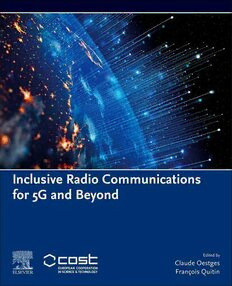
Inclusive Radio Communications for 5G and Beyond PDF
Preview Inclusive Radio Communications for 5G and Beyond
Inclusive Radio Communications for 5G and Beyond Inclusive Radio Communications for 5G and Beyond Edited by Claude Oestges ICTEAM - Electrical Engineering School of Engineering - Ecole Polytechnique de Louvain Université catholique de Louvain Louvain, Belgium François Quitin Brussels School of Engineering Université libre de Bruxelles Brussels, Belgium ThispublicationisbaseduponworkfromCOSTActionCA15104(IRACON),sup- portedbyCOST(EuropeanCooperationinScienceandTechnology). COST (European Cooperation in Science and Technology) is a funding agency for researchandinnovationnetworks.ThegoalofCOSTistohelpconnectresearchini- tiativesacrossEuropeandenablescientiststogrowtheirideasbysharingthemwith their peers. See www.cost.eu for more information. The research project CA15104 (IRACON)onwhichthisbookisbasedwasfundedbytheHorizon2020Framework ProgrammeoftheEuropeanUnion. www.cost.eu FundedbytheHorizon2020FrameworkProgramme oftheEuropeanUnion Copyright©2021ElsevierLtd.Allrightsreserved. Thisbookandtheindividualcontributionscontainedinitareprotectedundercopyright,andthe followingtermsandconditionsapplytotheiruseinadditiontothetermsofanyCreativeCommons (CC)orotheruserlicensethathasbeenappliedbythepublishertoanindividualchapter: Photocopying:Singlephotocopiesofsinglechaptersmaybemadeforpersonaluseasallowedby nationalcopyrightlaws.Permissionisnotrequiredforphotocopyingofchapterspublishedunderthe CCBYlicensenorforphotocopyingfornon-commercialpurposesinaccordancewithanyotheruser licenseappliedbythepublisher.Permissionofthepublisherandpaymentofafeeisrequiredforall otherphotocopying,includingmultipleorsystematiccopying,copyingforadvertisingorpromotional purposes,resale,andallformsofdocumentdelivery.Specialratesareavailableforeducational institutionsthatwishtomakephotocopiesfornon-profiteducationalclassroomuse. Derivativeworks:Usersmayreproducetablesofcontentsorpreparelistsofchaptersincludingabstracts forinternalcirculationwithintheirinstitutionsorcompanies.Otherthanforchapterspublishedunder theCCBYlicense,permissionofthepublisherisrequiredforresaleordistributionoutsidethe subscribinginstitutionorcompany.Foranysubscribedchaptersorchapterspublishedundera CCBY-NC-NDlicense,permissionofthepublisherisrequiredforallotherderivativeworks,including compilationsandtranslations. Storageorusage:Exceptasoutlinedaboveorassetoutintherelevantuserlicense,nopartofthis publicationmaybereproduced,storedinaretrievalsystemortransmittedinanyformorbyanymeans, electronic,mechanical,photocopying,recordingorotherwise,withoutpriorwrittenpermissionofthe publisher. Permissions:Forinformationonhowtoseekpermissionvisitwww.elsevier.com/permissionsorcall: (+1)800-523-4069x3808. Authorrights:Authorsmayhaveadditionalrightsintheirchaptersassetoutintheiragreementwith thepublisher(moreinformationathttp://www.elsevier.com/authorsrights). Notice:Practitionersandresearchersmustalwaysrelyontheirownexperienceandknowledgein evaluatingandusinganyinformation,methods,compoundsorexperimentsdescribedherein.Because ofrapidadvancesinthemedicalsciences,inparticular,independentverificationofdiagnosesanddrug dosagesshouldbemade.Tothefullestextentofthelaw,noresponsibilityisassumedbythepublisher foranyinjuryand/ordamagetopersonsorpropertyasamatterofproductsliability,negligenceor otherwise,orfromanyuseoroperationofanymethods,products,instructionsorideascontainedin thematerialherein.Althoughalladvertisingmaterialisexpectedtoconformtoethical(medical) standards,inclusioninthispublicationdoesnotconstituteaguaranteeorendorsementofthequality orvalueofsuchproductoroftheclaimsmadeofitbyitsmanufacturer. Publisher:MaraConner AcquisitionsEditor:TimPitts EditorialProjectManager:NaomiRobertson ProductionProjectManager:PaulPrasadChandramohan Designer:MatthewLimbert TypesetbyVTeX Contents Listofcontributors ............................................. xi CHAPTER 1 Introduction .................................. 1 Claude Oestges and François Quitin 1.1 Technologytrendsandchallenges .................... 1 1.2 Scopeofthebook ................................ 3 CHAPTER 2 Radio propagation modeling methods and tools .. 7 Katsuyuki Haneda, Richard Rudd, Enrico Vitucci, Danping He, Pekka Kyösti, Fredrik Tufvesson, Sana Salous, Yang Miao, Wout Joseph, and Emmeric Tanghe 2.1 Propagationenvironments .......................... 8 2.1.1 Introduction ............................... 8 2.1.2 Outdoorenvironment ........................ 8 2.1.3 Indoorenvironment ......................... 10 2.1.4 Outdoor-to-indoorenvironment ................ 10 2.1.5 Trainandothervehicularenvironments .......... 11 2.1.6 Body-centricenvironments.................... 12 2.2 Channelmodelclassification........................ 13 2.2.1 Site-specificchannelmodels .................. 13 2.2.2 Geometry-basedstochasticchannelmodels(GSCM) 25 2.2.3 EnhancedCOST2100model .................. 30 2.2.4 ReferenceITU-Rpathlossmodels .............. 33 2.2.5 Modelsfordensemultipathcomponents .......... 38 2.3 Algorithmsforestimationofradiochannelparameters .... 43 2.3.1 Narrowbandmultipathcomponentestimation ...... 43 2.3.2 Widebandmultipathcomponentestimation ....... 45 2.3.3 Multipathcomponentclustering ................ 46 2.3.4 Large-scaleparameterestimationwithlimited dynamicrange ............................. 48 CHAPTER 3 IRACON channel measurements and models ..... 49 Sana Salous, Davy Gaillot, Jose-Maria Molina-Garcia-Pardo, Ruisi He, Kentaro Saito, Ke Guan, Marina Barbiroli, Juan Pascual-Garcia, and Katsuyuki Haneda 3.1 Measurementscenarios ............................ 49 3.1.1 Summary ................................. 49 v vi Contents 3.2 mm-WaveandTerahertzchannels .................... 55 3.2.1 PathlossandRMSdelayspread ................ 55 3.2.2 Outdoor-to-indoorpropagation ................. 62 3.2.3 Cross-polardiscrimination,clustering,andmassive MIMO ................................... 65 3.2.4 Millimeter-WaveandTerahertzchannelsimulations . 74 3.2.5 Othereffects .............................. 77 3.3 MIMOandmassiveMIMOchannels ................. 83 3.3.1 MIMOchannelmeasurementandanalysis ........ 83 3.3.2 Wirelesssimulationtechniques................. 86 3.3.3 Antennadevelopment........................ 87 3.3.4 Electro-magneticcompatibilityanalysis .......... 88 3.3.5 MassiveMIMOsystemevaluation .............. 88 3.4 Fasttime-varyingchannels ......................... 90 3.4.1 ChannelcharacterizationofV2Xscenarios........ 92 3.4.2 COST-IRACONV2Vchannelmodelforurban intersections............................... 95 3.4.3 Widebandpropagationinrailwayscenarios ....... 97 3.4.4 NewparadigmforrealizingrealisticHSTchannelsin the5GmmWaveband ....................... 101 3.5 Electricalpropertiesofmaterials ..................... 104 3.5.1 Transmissionlossabove6GHz ................ 104 3.5.2 Materialproperties .......................... 104 CHAPTER 4 Over-the-Air testing ........................... 107 Wim Kotterman, Moray Rumney, and Pekka Kyösti 4.1 Introduction .................................... 107 4.2 Fieldemulationforelectricallylargetestobjects ......... 108 4.2.1 SectoredMPAC ............................ 109 4.2.2 Othermethods ............................. 112 4.3 EmulationofmmWavechannels ..................... 112 4.4 Extendingthepresentframework .................... 116 4.4.1 Complexityreductionforfieldemulations ........ 116 4.4.2 Testingspecificperformanceparameters.......... 116 4.4.3 Emulatinghumaninfluence ................... 118 4.4.4 Testbeds,additionalequipment................. 118 4.5 Concludingremarks .............................. 119 CHAPTER 5 Coding and processing for advanced wireless networks ..................................... 121 Jan Sykora, Andreas Czylwik, Laurent Clavier, and Alister Burr Introduction .................................... 121 5.1 Advancedwaveforms,coding,andsignalprocessing ...... 121 Contents vii 5.1.1 Modelsandbounds ......................... 121 5.1.2 Pre-codingandbeamforming ................. 126 5.1.3 Channelestimationandsynchronization .......... 126 5.1.4 Newwaveforms ............................ 127 5.2 DistributedandcooperativePHYprocessinginwireless networks....................................... 128 5.2.1 Cooperativerelaying ........................ 128 5.2.2 Wirelessphysical-layernetworkcoding .......... 130 5.2.3 Distributedcooperativeaccessnetworks .......... 131 5.2.4 Distributedsensing.......................... 132 5.3 MassiveMIMO ................................. 133 5.3.1 ProcessingandcodingforMassiveMIMO ........ 133 5.3.2 PerformanceevaluationandmodelingforMassive MIMO ................................... 135 5.4 Full-duplexcommunicationsandHWimplementationdriven solutions ....................................... 137 5.4.1 Full-duplexcommunications .................. 137 5.4.2 HWspecificmodelsandimplementations ........ 138 CHAPTER 6 5G and beyond networks ....................... 141 Silvia Ruiz, Hamed Ahmadi, Gordana Gardaševic´, Yoram Haddad, Konstantinos Katzis, Paolo Grazioso, Valeria Petrini, Arie Reichman, M. Kemal Ozdemir, Fernando Velez, Rui Paulo, Sergio Fortes, Luis M. Correia, Behnam Rouzbehani, Mojgan Barahman, Margot Deruyck, Silvia Mignardi, Karim Nasr, and Haibin Zhang 6.1 Introduction .................................... 141 6.2 Ad-hocandV2Vnetworks ......................... 142 6.2.1 Predictionandreliability ..................... 143 6.2.2 Networksimulation/emulationplatforms ......... 145 6.2.3 Energyharvesting .......................... 146 6.2.4 Measurementsforspecificapplications........... 147 6.3 Spectrummanagementandsharing ................... 147 6.3.1 IoT/machinetypecommunications .............. 147 6.3.2 Coexistenceandsharing ...................... 149 6.3.3 Fieldmonitoring ........................... 154 6.3.4 Virtualizednetworks ........................ 155 6.4 Radioresourcemanagementandscheduling ............ 156 6.4.1 Resourceallocationinwirelessmeshnetworks ..... 158 6.4.2 RRMforD2Dscenario ...................... 159 6.4.3 RRMviafrequencyreuse ..................... 160 6.4.4 PCAforhighercapacity ...................... 162 6.4.5 ResourceallocationandsharingforHetNets....... 163 viii Contents 6.4.6 ARRMtool ............................... 164 6.5 Heterogeneousnetworksandultradensenetworks ....... 164 6.5.1 Scenariosandcapacityevaluationforsmallcell heterogeneousnetworks ...................... 164 6.5.2 Systemlevelevaluationofdynamicbasestation clusteringforcoordinatedmulti-point............ 165 6.5.3 Comparisonofthesystemcapacitybetweenthe UHF/SHFbandsandmillimeterwavebands ....... 165 6.5.4 Cost/revenuetrade-offinsmallcellnetworksinthe millimeterwavebands ....................... 168 6.5.5 Effectsofhyper-densesmall-cellnetwork deploymentsonarealisticurbanenvironment...... 169 6.5.6 Advancedmanagementandserviceprovisionfor ultradensenetworks......................... 169 6.5.7 IPmobilityandSDN ........................ 172 6.5.8 Digitalgeographicaldataandradiopropagation modelsenhancementformmWavesimulation ..... 173 6.6 C-RAN........................................ 175 6.6.1 ResourcemanagementinC-RAN ............... 175 6.6.2 C-RANdeployment ......................... 176 6.7 SDNandNFV .................................. 179 6.7.1 Virtualradioresourcemanagementmodel ........ 179 6.7.2 AnalysisofVRRMresults .................... 180 6.8 UAVsandflyingplatforms ......................... 181 6.8.1 UAVtrajectorydesignandradioresource management .............................. 181 6.8.2 UAV-aidednetworkplanningandperformance ..... 182 6.9 Emergingservicesandapplications ................... 185 6.9.1 Smartgrids ............................... 185 6.9.2 Vehicularapplications ....................... 185 6.9.3 Publicprotectionanddisasterreliefsystems ....... 186 CHAPTER 7 IoT protocols, architectures, and applications ... 187 ChiaraBuratti,ErikStröm,LucaFeltrin,LaurentClavier, Gordana Gardaševic´, Thomas Blazek, Lazar Berbakov, Titus Constantin Balan, Luis Orozco-Barbosa, Carles Anton-Haro, Piotr Rajchowski, and Haibin Zhang 7.1 Lowpowerwideareanetworks ...................... 188 7.1.1 LoRaWAN ................................ 188 7.1.2 NB-IoT .................................. 191 7.2 MACandroutingprotocolsforIoT ................... 193 7.2.1 6TiSCHprotocolstack ....................... 194 7.2.2 Jointschedulingandroutingprotocols ........... 195 7.2.3 Routingprotocolsandcongestioncontrol ......... 196 Contents ix 7.3 Vehicularcommunications ......................... 198 7.3.1 Antennadesignandintegration ................ 199 7.3.2 Highmobilityperformanceanalysisandmodeling .. 201 7.4 Energyefficient/constrainedsolutionsforIoT ........... 205 7.4.1 EnergyefficiencyinIoT ...................... 205 7.4.2 Energyharvestingaspects .................... 207 7.5 SDNandNFVforIoT ............................ 211 7.5.1 Software-definedIoTnetworks................. 211 7.5.2 IntegratingdifferentIoTtechnologies ............ 213 7.5.3 VirtualizationofIoT ........................ 215 7.6 SpecialapplicationsofIoT ......................... 217 7.7 Conclusions .................................... 220 CHAPTER 8 IoT for healthcare applications ................. 221 Kamran Sayrafian, Sławomir J. Ambroziak, Dragana Bajic, Lazar Berbakov, Luis M. Correia, Krzysztof K. Cwalina, Concepcion Garcia-Pardo, Gordana Gardaševic´, Konstantinos Katzis, Pawel Kulakowski, and Kenan Turbic 8.1 WearableandimplantableIoT-healthtechnology ........ 222 8.1.1 Channelmeasurementandmodeling: On-body-to-off-body ........................ 222 8.1.2 Channelmeasurementandmodeling: On-body-to-on-body ........................ 231 8.1.3 Channelmeasurementandmodeling: In-body-to-on-bodyandin-body-to-off-body ...... 232 8.1.4 HumanbodyphantomsandSARmeasurement..... 233 8.2 IoT-healthnetworkingandapplications................ 240 8.2.1 Networkingandarchitectures .................. 241 8.2.2 Applications .............................. 244 8.3 Nanocommunications ............................. 249 8.3.1 Nanocommunicationmechanisms .............. 249 8.3.2 Interfacewithmicro-andmacro-scalenetworks .... 251 CHAPTER 9 Localization and tracking ...................... 253 Klaus Witrisal, Carles Anton-Haro, Stefan Grebien, Wout Joseph, Erik Leitinger, Xuhong Li, José A. Del Peral-Rosado, David Plets, Jordi Vilà-Valls, and Thomas Wilding 9.1 Introduction .................................... 254 9.1.1 Newapplicationscenarios,userrequirements ...... 254 9.1.2 Technicalchallenges ........................ 256 9.1.3 Expectedfeaturesandlimitationsof5Gandcurrent IoTtechnologies:Impactinpositioning .......... 257
